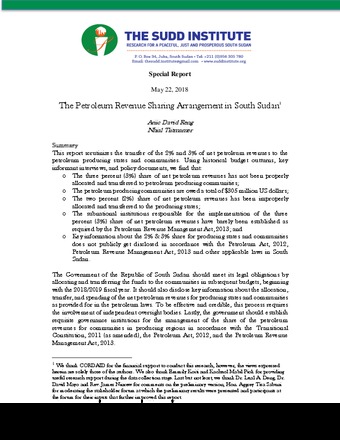The Petroleum Revenue Sharing Arrangement in South Sudan
Publication Summary
This report scrutinizes the transfer of the 2% and 3% of net petroleum revenues to the petroleum producing states and communities. Using historical budget outturns, key informant interviews, and policy documents, we find that:
- The three percent (3%) share of net petroleum revenues has not been properly allocated and transferred to petroleum producing communities;
- The petroleum producing communities are owed a total of $305 million US dollars;
- The two percent (2%) share of net petroleum revenues has been improperly allocated and transferred to the producing states;
- The subnational institutions responsible for the implementation of the three percent (3%) share of net petroleum revenues have barely been established as required by the Petroleum Revenue Management Act, 2013; and
- Key information about the 2% & 3% share for producing states and communities does not publicly get disclosed in accordance with the Petroleum Act, 2012, Petroleum Revenue Management Act, 2013 and other applicable laws in South Sudan.
The Government of the Republic of South Sudan should meet its legal obligations by allocating and transferring the funds to the communities in subsequent budgets, beginning with the 2018/2019 fiscal year. It should also disclose key information about the allocation, transfer, and spending of the net petroleum revenues for producing states and communities as provided for in the petroleum laws. To be effective and credible, this process requires the involvement of independent oversight bodies. Lastly, the government should establish requisite governance institutions for the management of the share of the petroleum revenues for communities in producing regions in accordance with the Transitional Constitution, 2011 (as amended), the Petroleum Act, 2012, and the Petroleum Revenue Management Act, 2013.
Ariic David Aguto Reng's Biography
Ariic David Aguto Reng holds a bachelor of Management (Financial Economics) from the University of Toronto and a Master of Arts in Economics. He has a wealth of professional experience working in the public and the private sectors. He has worked for the Canadian Revenue Agency (CRA), The Ontario Ministry of Agriculture & Rural Affairs, Directorate of Economic Innovation. More recently with Deloitte Consulting LLP, he was an Analyst for a USAID-funded project aimed at creating macroeconomic stability and promoting core economic governance within Ministry of Finance and Economic Planning (MOFEP), Bank of South Sudan (BOSS), and the Ministry of Petroleum and Mining (MPMI). He is currently the Business Manager of the Eye Radio where he is managing and implementing a USAID-funded media development grant in South Sudan. Mr. Ariic is also an Associate Lecturer at the University of Juba where he teaches Fiscal Management in the Public Sector at the School of Public Service (SPS).
Nhial Tiitmamer has served as the Director of the Environment and Natural Resources Program at The Sudd Institute where he is currently on leave to work with United Nations in South Sudan (UNMISS). He has served as an Adjunct Assistant Professor at the University of Juba where he has taught Environmental Economics, Natural Resources Economics and Environmental Sociology. Between November 2021 and November 2022, Nhial worked as Senior Environment Associate with the United Nations High Commissioner for Refugees (UNHCR) in Juba. Before returning from Canada in 2013, Nhial worked at Arletta Environmental Consulting in Calgary and at University of Alberta’s Augustana Campus in Camrose in Alberta, Canada. Nhial’s research focusses on natural resources governance, environmental protection, climate change, and sustainable energy. He was awarded in May 2023 by the Board of Directors of The Sudd Institute with Research Impact Award for policy impacts. Nhial holds a B.A. in Environmental Studies with a minor in English Literature from the University of Alberta and an M.Sc. in Sustainable Energy Development from the University of Calgary in Alberta, Canada.

